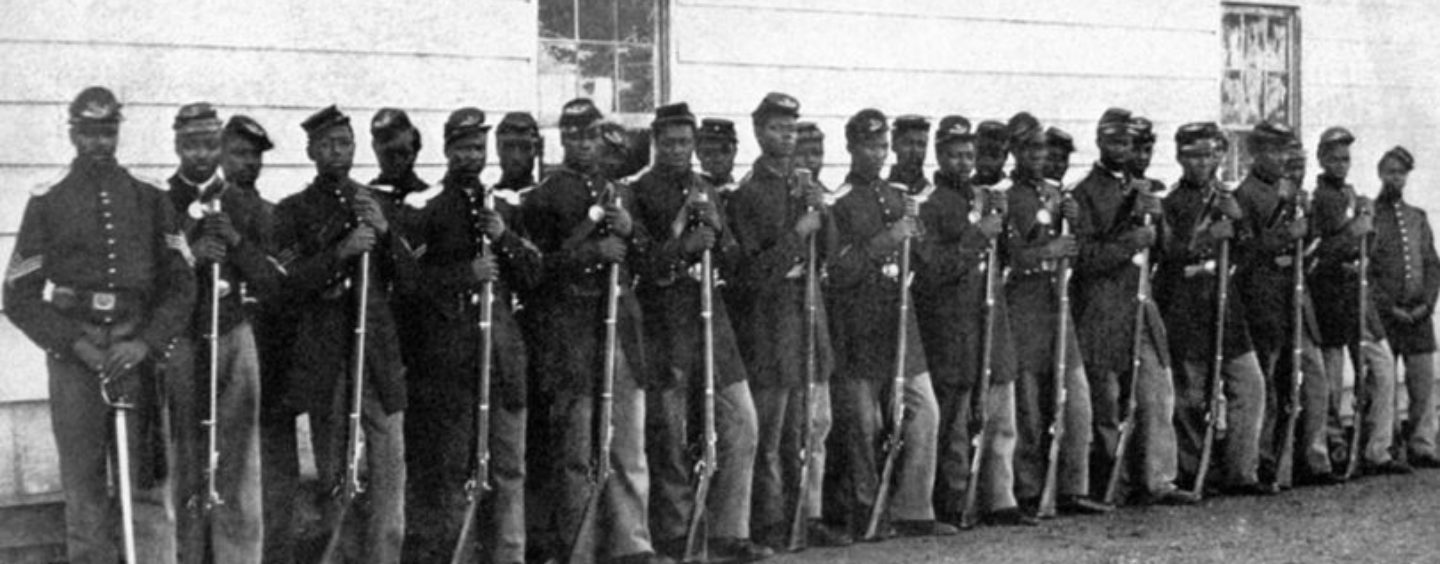
Black Civil War Regiment Honored in Detroit
by Stacy M. Brown, NNPA Newswire Senior National Correspondent @StacyBrownMedia 05/17/2021Officials in Detroit have unveiled the 102nd United States Colored Troop Memorial Highway, honoring the heroic African American Infantry Regiment formed during the Civil War in 1863.
The dedication of a portion of I-375 took place at the same spot where the regiment was first organized.
“You will never overcome anything that you are not willing to confront. And I think that what these men did when they confronted racism, they confronted white supremacy head-on. They won,” said former city lawmaker Senator Coleman Young II during the ceremony.
According to the Detroit Historical Society, the 1,400-person troop – which included 845 escaped slaves, were initially called the Corps d’Afrique by the Detroit Free Press.
After forming, they became the 102nd United States Colored Infantry.
“The regiment was made entirely of volunteers from Canada and Detroit that were formed through Detroit’s Black leaders’ efforts,” historians noted.
“In all, about 1,400 Black soldiers enlisted, and of these, 1,000 had been born in slave states. Raised at Camp Ward, the troops were commanded by White officers, paid no bounty, and allotted ten dollars per month with one ration per day, while three dollars of their monthly pay was deducted for clothing.”
The regiment saw service in South Carolina, Georgia, and Florida during several civil war engagements.
They fought Confederate forces throughout November 1864, engaging at Honey Hill, Tillifany, and Deveaux Neck.
“Their bravery was shown on multiple occasions, such as Gorhamsville, when they repulsed an enemy charge and countercharged, for which they received official commendations from their officers,” Detroit Historical Society officials noted.
These officers said that “The artillery from the expedition suffered severely from the enemy’s fire, so many horses being killed that two guns had to be abandoned, but the men of the First hauled them off by hand, and they were saved.”
Later, according to historians, the regiment served in South Carolina.
In February 1865, they were reunited at Pocatalligo and launched several Confederate territory expeditions, destroying railroads and breastworks.
They then built defenses in Charleston and were sent to Savannah, Georgia.
The regiment was divided into two wings, made several raids, and defeated the Confederate forces in every skirmish.
It was serving in this capacity that they received the news that Generals Robert E. Lee and Joseph E. Johnston had surrendered.
“The history of our 102nd is a pride for our entire nation. The fact that this is a unit that was born here in Detroit, Michigan, is a pride our entire state,” said Lt. Gov. Garlin Gilchrist.
According to the local Fox 2 News Channel, the resolution to rename the highway was first-authored by Young, the former lawmaker.
“To name that and have people drive past that, especially since we are honoring colored troops on a freeway that was built to drive through Black neighborhoods. I think that history is also very important for us to realize,” Young remarked.
Excerpt:
“In all, about 1,400 Black soldiers enlisted, and of these, 1,000 had been born in slave states. Raised at Camp Ward, the troops were commanded by White officers, paid no bounty, and allotted ten dollars per month with one ration per day, while three dollars of their monthly pay was deducted for clothing.”
Photo Caption:
“You will never overcome anything that you are not willing to confront. And I think that what these men did when they confronted racism, they confronted white supremacy head-on. They won,” said Senator Coleman Young II. (Photo: Detroit Historical Society Facebook Page)
Website Tags and Keywords:
Stacy M. Brown, NNPA Newswire, Detroit, 102nd United States Colored Troop Memorial Highway, heroic African American Infantry Regiment, Civil War, I-375, confronted racism, confronted white supremacy, Coleman Young II, Detroit Historical Society, 1400-person troop, 845 escaped slaves, Corps d’Afrique, Detroit Free Press, Volunteers, Canada, Detroit, Detroit’s Black leaders’ efforts, slave states, Camp Ward, White officers, paid no bounty, allotted ten dollars per month, one ration per day, South Carolina, Georgia, Florida, civil war engagements, Confederate forces, Honey Hill, Tillifany, Deveaux Neck, Gorhamsville, Detroit Historical Society officials, South Carolina, Pocatalligo, Confederate territory expeditions, Charleston, Savannah Georgia, Generals Robert E. Lee, Joseph E. Johnston, Lt. Gov. Garlin Gilchrist
Twitter Tags/Handles:
@StacyBrownMedia @NNPA_BlackPress @LtGovGilchrist @ColemanYoungII


